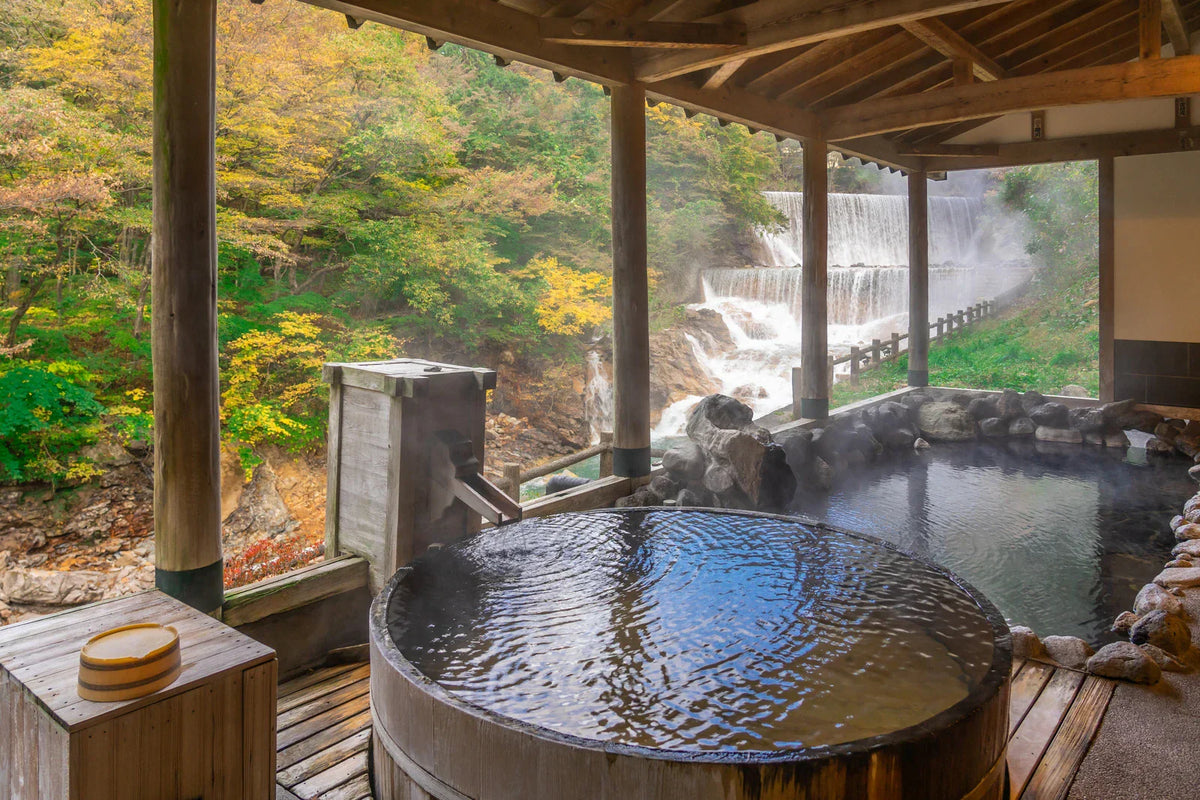
The Timeless Serenity of Japanese Baths You Didn't Know You Needed
|
|
Time to read 4 min
|
|
Time to read 4 min
The Japanese bath, or "ofuro," is more than just a means of cleanliness—it's a ritual that has been cherished in Japanese culture for centuries. Originating in the early part of Japanese history, the ofuro bath is deeply embedded in the nation's traditions and way of life. It's not just about washing away the day's grime; it's about cleansing the soul.
In modern Japanese society, the ofuro holds a special place as a sanctuary for relaxation and reflection. Many Japanese homes still feature traditional wooden ofuro tubs, offering a peaceful retreat from the hectic pace of daily life. For the Japanese, bathing is not just a necessity but an art form that continues to influence their culture and lifestyle.
Japanese bathing rituals are steeped in tradition and etiquette, elevating the simple act of bathing to a meditative experience. Before entering the ofuro, it's customary to wash and rinse the body thoroughly, ensuring that the bathwater remains clean for soaking. This ritualistic cleansing underscores the importance of purity in Japanese culture.
The spiritual and health benefits of the Japanese bathing ritual are profound. Immersing oneself in the warm, soothing waters of the ofuro can reduce stress, alleviate muscle tension, and improve circulation. It's no wonder that the Japanese bath is seen as both a physical and spiritual rejuvenation, promoting overall well-being for those who partake in its serene waters.
The design and construction of Japanese bathtubs are unique, reflecting a blend of tradition and craftsmanship. Ofuro tubs are typically made of aromatic woods like hinoki, which release a calming scent when in contact with hot water. The materials used are not only chosen for their aesthetic appeal but also for their durability and resistance to rot, ensuring a long-lasting bathing experience.
The compact size and deep structure of the ofuro allow for full submersion, enhancing the relaxing effect of the bath. The craftsmanship that goes into constructing an ofuro is meticulous, focusing on creating a seamless and watertight vessel that can hold the heat for extended periods, allowing for prolonged moments of relaxation and meditation.
In both traditional and contemporary Japanese homes, the ofuro serves as a focal point for family life and personal rituals. Traditionally, families would gather at the end of the day to share the experience of bathing, fostering a sense of togetherness and community. Even today, many Japanese people consider the ofuro an essential part of their daily routine, providing a haven for personal reflection.
The integration of ofuro in modern homes has evolved, with sleek designs that incorporate modern conveniences while preserving the traditional aspects of the bath. Whether it’s a standalone wooden tub or a part of a sophisticated bathroom suite, the ofuro continues to play a vital role in Japanese households, symbolizing the balance between tradition and modernity.
Japan's onsen culture, centered around natural hot springs, offers a communal bathing experience that contrasts with the private retreat of the home ofuro. Onsen are typically outdoor, set in picturesque landscapes that enhance the experience with breathtaking views and the sounds of nature. These public hot springs offer a social atmosphere where guests can relax and converse, often enjoying the therapeutic benefits of mineral-rich waters.
While both the onsen and the ofuro provide relaxation and health benefits, the experiences differ significantly. Onsen visits are often seen as a special occasion, while the home ofuro represents a more intimate, daily ritual. Each form of bathing offers its own unique appeal and set of health benefits, allowing individuals to choose their preferred method of relaxation.
For visitors to Japan, understanding and respecting Japanese bathing etiquette is crucial to fully enjoy the ofuro experience. When visiting an onsen or using an ofuro in a ryokan (traditional inn), it's important to remember a few key rules. Always wash and rinse thoroughly before entering the communal baths, and refrain from bringing towels or soap into the ofuro.
Silence and tranquility are highly valued during the bathing experience, so keep conversations quiet and respectful. For those with tattoos, be aware that some onsens may restrict entry due to traditional associations with organized crime. However, many places are becoming more accommodating, so it's always best to check beforehand.
The allure of the Japanese bathing culture has transcended its borders, influencing spa and wellness practices globally. In recent years, elements of the ofuro have been adopted by luxury spas and wellness centers worldwide, offering clients a taste of Japanese tranquility and tradition. From wooden soaking tubs in high-end resorts to urban wellness centers offering Japanese-style baths, the influence of the ofuro is evident.
This global appreciation of Japanese bathing rituals highlights their universal appeal and adaptability, allowing people from different cultures to experience and benefit from their calming effects. The influence of the ofuro continues to grow, as more people seek out holistic and immersive wellness experiences.
The enduring appeal of Japanese bathing culture lies in its ability to offer both physical and spiritual rejuvenation. The ofuro's timeless design, combined with its meditative ritual, provides a unique blend of tradition and modernity that resonates with people around the world. Whether enjoyed in the privacy of a Japanese home or the communal setting of an onsen, the Japanese bath remains a symbol of serenity and well-being.
For those intrigued by this aspect of Japanese culture, exploring the world of the ofuro can be a rewarding experience. Whether you choose to visit Japan or incorporate elements of Japanese bathing into your own home, the benefits of these ancient practices offer a pathway to relaxation and mindfulness in our fast-paced world.